| Sonnet 52 | |||||||
|---|---|---|---|---|---|---|---|
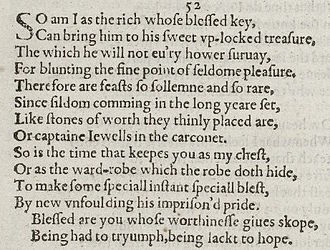 Sonnet 52 in the 1609 Quarto | |||||||
| | |||||||
| |||||||
Sonnet 52 is one of 154 sonnets written by the English playwright and poet William Shakespeare. It is a member of the Fair Youth sequence, in which the poet expresses his love towards a young man.
| Sonnet 52 | |||||||
|---|---|---|---|---|---|---|---|
 Sonnet 52 in the 1609 Quarto | |||||||
| | |||||||
| |||||||
Sonnet 52 is one of 154 sonnets written by the English playwright and poet William Shakespeare. It is a member of the Fair Youth sequence, in which the poet expresses his love towards a young man.
Sonnet 52 is an English or Shakespearean sonnet. It contains three quatrains followed by a final rhyming couplet. It follows the typical rhyme scheme of the English sonnet, ABAB CDCD EFEF GG, and is composed in iambic pentameter, a type of poetic metre based on five pairs of metrically weak/strong syllabic positions. The twelfth line exemplifies a regular iambic pentameter:
× / × / × / × / × / By new unfolding his imprison'd pride. (52.12)
The fourth line has a final extrametrical syllable or feminine ending (as does the second line). It also has its second ictus moved to the right (resulting in a four-position figure, × × / /, sometimes referred to as a minor ionic):
× / × × / / × / × / (×) For blunting the fine point of seldom pleasure. (52.4)
The meter demands some variant pronunciations: the second line's "uplockèd", the seventh's "placèd", and the eighth's "jewels" all count as two syllables. In the fourteenth line, the first occurrence of "being" is one syllable, the second is two syllables.
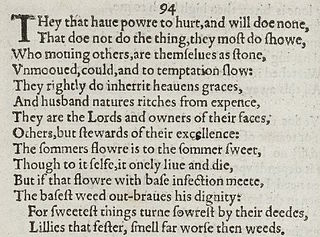
Sonnet 94 is one of 154 sonnets written by the English playwright and poet William Shakespeare. It is a member of the Fair Youth sequence, in which the poet expresses his love towards a young man.
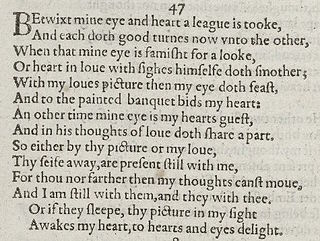
Shakespeare's Sonnet 47 is one of the Fair Youth sequence, addressed to a well-born young man. More locally, it is a thematic continuation of Sonnet 46.

Sonnet 61 is one of 154 sonnets written by the English playwright and poet William Shakespeare. It is a member of the Fair Youth sequence, in which the poet expresses his love towards a young man.

Sonnet 91 is one of 154 sonnets written by the English playwright and poet William Shakespeare. It's a member of the Fair Youth sequence, in which the poet expresses his love towards a young man.
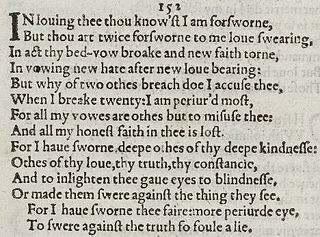
Sonnet 152 is a sonnet by William Shakespeare. It is one of a collection of 154 sonnets, dealing with themes such as the passage of time, love, beauty and mortality, first published in a 1609.
Sonnet 149 is one of 154 sonnets written by the English playwright and poet William Shakespeare.

Sonnet 142 is one of 154 sonnets written by the English playwright and poet William Shakespeare.

Sonnet 139 is one of 154 sonnets written by the English playwright and poet William Shakespeare.

Sonnet 131 is a sonnet written by William Shakespeare and was first published in a 1609 quarto edition titled Shakespeare's sonnets. It is a part of the Dark Lady sequence, which are addressed to an unknown woman usually assumed to possess a dark complexion.

Sonnet 75 is one of 154 sonnets written by the English playwright and poet William Shakespeare. It is a member of the Fair Youth sequence, in which the poet expresses his love towards a young man.

Sonnet 119 is one of 154 sonnets written by the English playwright and poet William Shakespeare. It's a member of the Fair Youth sequence, in which the poet expresses his love towards a young man.

Sonnet 90 is one of 154 sonnets written by the English playwright and poet William Shakespeare. It is a member of the Fair Youth sequence, in which the poet expresses his love towards a young man.
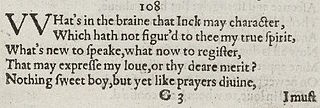
Sonnet 108 is one of 154 sonnets written by the English playwright and poet William Shakespeare. It is a member of the Fair Youth sequence, in which the poet expresses his love towards a young man.

Sonnet 111 is one of 154 sonnets written by the English playwright and poet William Shakespeare. It is a member of the Fair Youth sequence, in which the poet expresses his love towards a young man.
Sonnet 113 is one of 154 sonnets written by the English playwright and poet William Shakespeare. It's a member of the Fair Youth sequence, in which the poet expresses his love towards a young man.

Sonnet 114 is one of 154 sonnets written by the English playwright and poet William Shakespeare. It is a member of the Fair Youth sequence, in which the poet expresses his love towards a young man.

Sonnet 115 is one of 154 sonnets written by the English playwright and poet William Shakespeare. It is a member of the Fair Youth sequence, in which the poet expresses his love towards a young man.
Sonnet 120 is one of 154 sonnets written by the English playwright and poet William Shakespeare. It's a member of the Fair Youth sequence, in which the poet expresses his love towards a young man.

Shakespeare's sonnet 117 was first published in 1609. It uses similar imagery to Sonnet 116 and expands on the challenge in the closing couplet. Using legally resonant metaphors, the poet defends himself against accusations of ingratitude and infidelity by saying that he was merely testing the constancy of those same things in his friend.

Sonnet 121 is one of 154 sonnets written by the English playwright and poet William Shakespeare. It is a member of the Fair Youth sequence, in which the poet expresses his love towards his young lover.